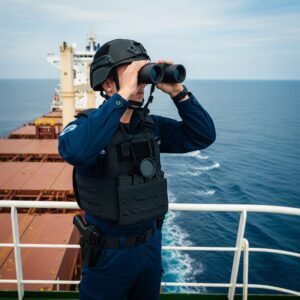Duration:
5 Days (Intensive)
Objective:
To train civilian operators with the knowledge and skills needed to operate in an embarked maritime security team, protecting ships and crews in high-risk areas. The course complies with (or is strongly inspired by) international standards (e.g. ISPS Code, BMP5, ISO 28007-1) and industry best practices.
Prerequisites:
- Medical certificate of physical fitness.
- Good knowledge of English (for maritime terminology and communications).
- Previous experience in security or law enforcement/military is preferred, but not mandatory.
- Holding an STCW (Standards of Training, Certification and Watchkeeping for Seafarers) certificate such as “Security Awareness” or “Designated Security Duties” is a plus and may be a requirement for actual embarkation. May be offered as an additional module or prerequisite.
- For the shooting component, a valid firearms license for self-defense or sporting use is mandatory, given the nature of the course.
Day 1: Fundamentals of Maritime Security and International Law
- Morning (09:00 – 13:00): Introduction to Maritime Security
o Overview of modern piracy, maritime terrorism and other threats (e.g. stowaways, smuggling).
o Role and responsibilities of the Maritime Security Operator (MSO).
o Structure of a Private Maritime Security Company (PMSC) and on-board security team.
o International Code for the Security of Ships and Port Facilities (ISPS Code): Overview and implications for MSOs.
o Best Management Practices for Protection against Somalia-based Piracy (BMP5) and other guidelines.
- Afternoon (14:00 – 18:00): Maritime Law and Rules of Engagement (ROE)
o International laws governing the use of force on the high seas (UNCLOS, right of self-defense).
o Last Resort concept: When and how to use lethal force.
o Study and analysis of specific Rules of Engagement (ROE) for anti-piracy operations. Importance of respecting ROE.
o Real incidents and case studies.
Day 2: Naval Security and Anti-Piracy Tactics
- Morning (09:00 – 13:00): Risk Assessment and Security Planning
o Route and ship-specific threat analysis.
o Vessel vulnerability assessment: identification of weak and strong points.
o On-board security planning: defensive lay-out (citadel, physical barriers, alarm systems).
o Con-ops (Concept of Operations): Development of operational plans for the protection of the vessel.
- Afternoon (14:00 – 18:00): Anti-Piracy Procedures on Board
o Alert and response protocols to the attack.
o Alarm exercises: use of on-board communication systems.
o Role of the security team during an attack: positioning, observation, deterrence.
o Management of the “citadel” (Citadel): preparation, equipment, access/exit procedures.
Day 3: Armament, Operational Shooting and Access Control
- Morning (09:00 – 13:00): Armament and Marine Specific Safe Handling
o Common weapon types used by PMSCs (assault rifles, pistols, non-lethal weapons).
o Safe handling in a confined and unstable environment (ship deck).
o Maintenance of weapons in a marine environment (salt corrosion).
o Dry simulations of ship firing positions.
- Afternoon (14:00 – 18:00): Operational Shooting and Access Control
o Practical session on the range: Shooting from unstable or confined positions (simulating naval spaces).
o Moving and reactive shooting at targets simulating remote threats.
o Shooting techniques at floating or moving targets.
o Control of access on board: embarkation/disembarkation procedures, inspection of personnel and baggage/cargo.
Day 4: Communications, Observation and Reporting
- Morning (09:00 – 13:00): Communications and Coordination
o Use of maritime radio communication systems (VHF, HF, satellite).
o Standard radio procedures (international phonetic alphabet, maritime terminology).
o Communication with the crew, the Master, and the operations center on land.
o Emergency communications and SOS protocols.
- Afternoon (14:00 – 18:00): Observation, Identification and Reporting
o Long-range observation techniques (binoculars, optical systems, on-board radar).
o Identification of potential threats (mother ships, pirate skiffs, dhows).
o Logbook keeping and writing of incident/observation reports.
o Briefing and Debriefing: Importance of clear and concise communication.
Day 5: Integrated Exercises and Simulations
- Morning (09:00 – 13:00): Team and Procedural Exercises
o Piracy alert simulations with the whole team: from detection to implementation of countermeasures.
o Deployment exercises of physical barriers (barbed wire, fire hoses).
o Evacuation simulations and management of the citadel.
o Management of complex scenarios (e.g. man overboard in a risk area, technical failure during an action).
- Afternoon (14:00 – 18:00): Advanced Scenarios and Final Debriefing
o Simulations on a ship bridge (or mock-up): reaction to multiple engagement, cover and suppressive fire.
o Simulation of a complete mission, from planning to execution.
o Detailed course debriefing: analysis of individual and team performance.
o Q&A, career advice in the sector.


